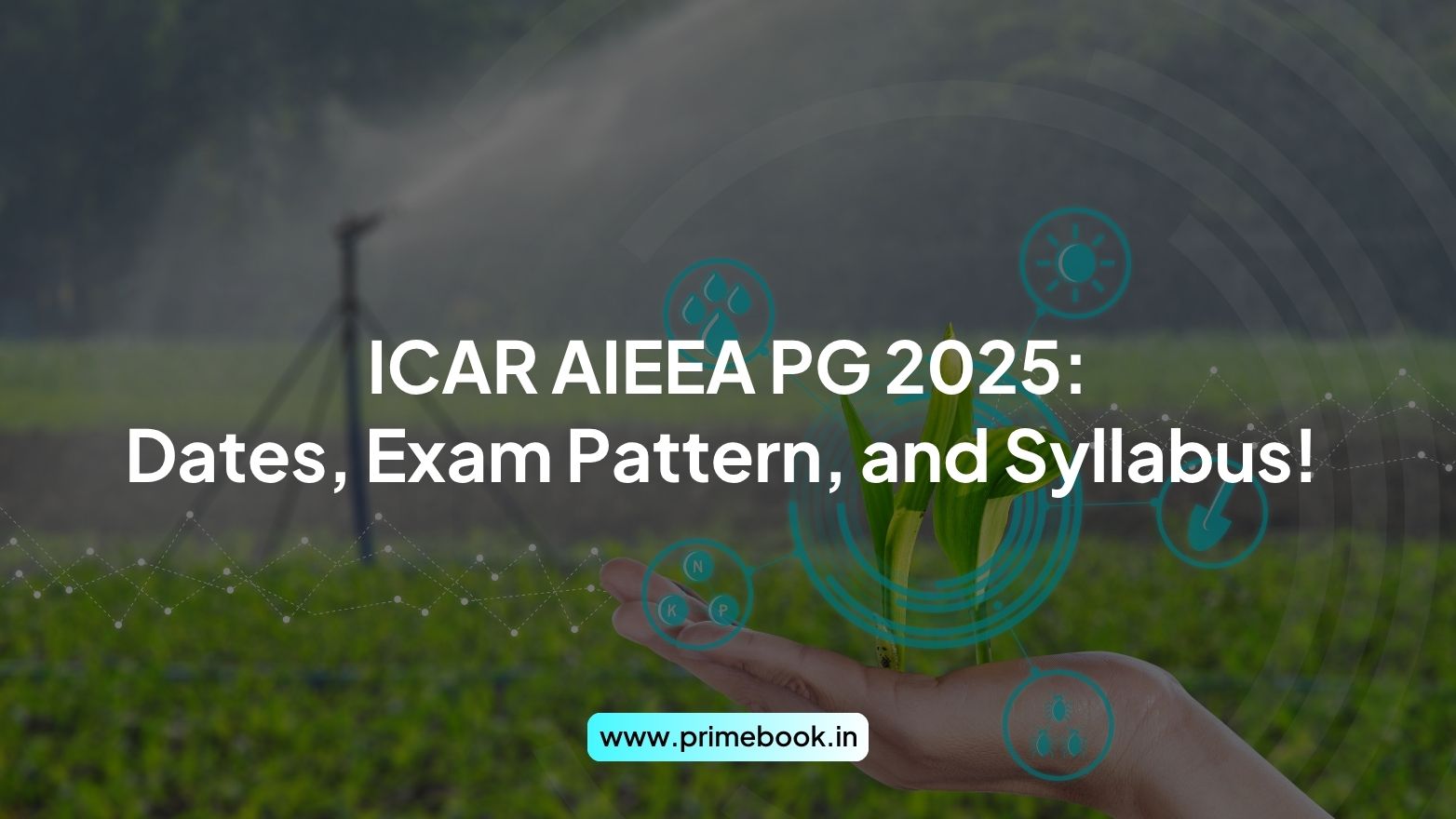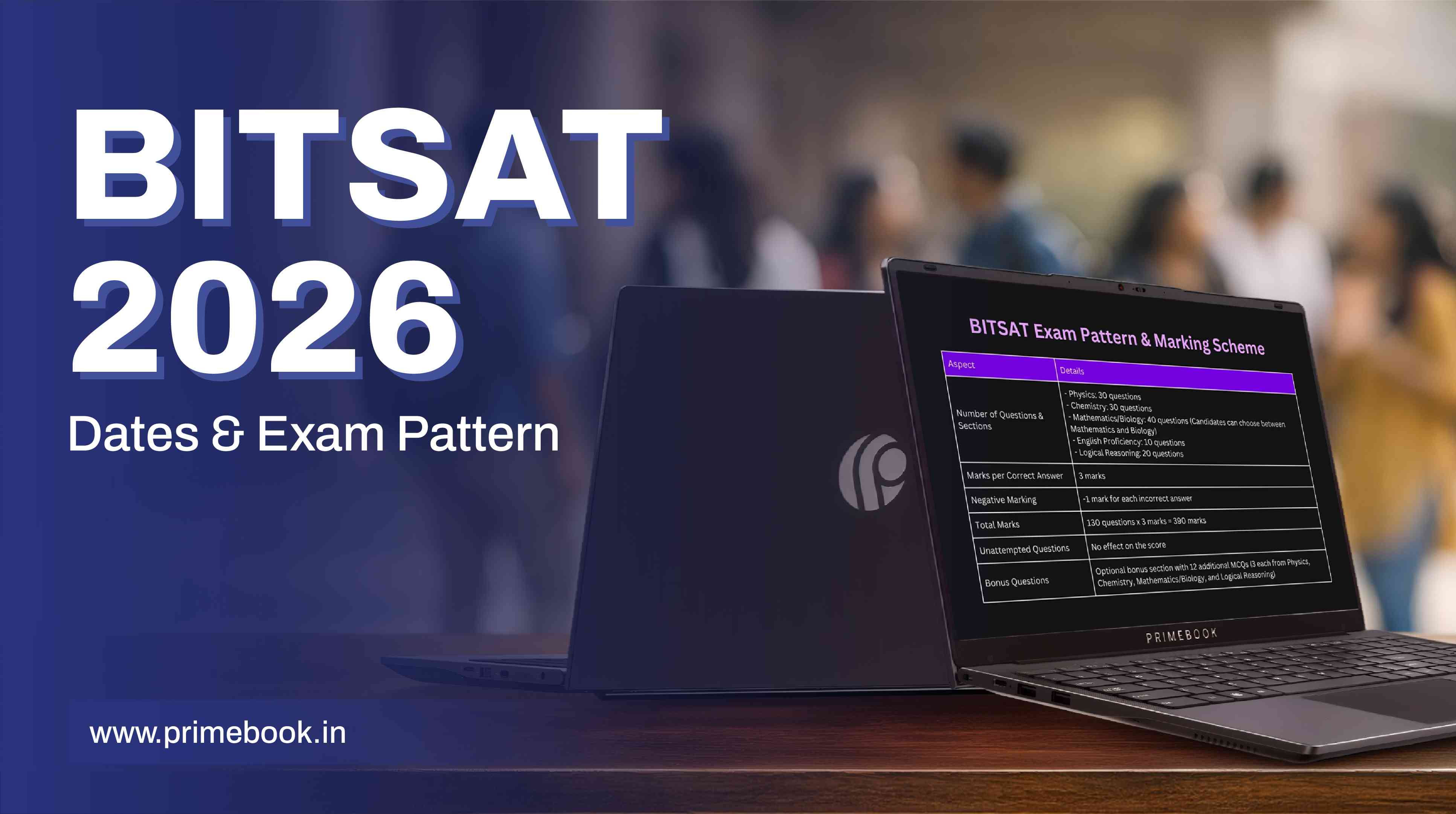Blogs / Student's Corner / ICAR AIEEA PG 2025: Dates, Exam Pattern, and Syllabus!
Blogs / Student's Corner / ICAR AIEEA PG 2025: Dates, Exam Pattern, and Syllabus!

Primebook Team
30 May 2025

ICAR AIEEA PG 2025: Dates, Exam Pattern, and Syllabus!
Postgraduation (PG) in agriculture is more than just a degree. It’s the door to gaining specialisation and the gateway to the research world. But before you step up towards your goal, one exam stands between you and your desired ICAR-recognised university. That’s AIEEA PG 2025. With applications now open and the exam day nearing, it's crucial to align your preparation with what it demands, from the exam pattern to the syllabus mapped to your selected subject group. So, here’s a comprehensive layout of the ICAR AIEEA PG 2025 exam, covering key dates, the exam pattern, and a detailed syllabus overview to help you prep with clarity and direction.
Overview of ICAR AIEEA PG 2025
The All India Entrance Examination for Admission, Postgraduate, or AIEEA PG is a national-level entrance exam conducted by the National Testing Agency (NTA) on behalf of the Indian Council of Agricultural Research (ICAR). The exam is meant for admissions to PG programs in agriculture and allied sciences offered at ICAR-accredited universities across India. Through this exam, you can get admission across 20 major subject groups, including Agronomy, Horticulture, Animal Sciences, Soil Science, Agricultural Engineering, etc.
Unlike AIEEA UG 2025, integrated within CUET UG, AIEEA PG 2025 will be conducted separately, and ICAR seats will be allotted based on your performance in this exam, followed by the online counselling conducted centrally by ICAR.
Admissions granted through this exam will cover:
-
Master’s degree programs in Central Agricultural Universities, State Agricultural Universities, and ICAR-Deemed universities.
-
ICAR-PG scholarships for eligible rank holders (subject to merit and category).
ICAR AIEEA PG 2025 Important Dates
Staying informed about the official exam schedule, from registration dates to exam dates and results, is crucial for timely preparation. Below is the detailed timeline for ICAR AIEEA PG 2025.
|
ICAR AIEEA PG 2025 Registration Start Date |
6th May, 2025 |
|
ICAR AIEEA PG 2025 Registration End Date |
5th June, 2025 |
|
ICAR AIEEA PG 2025 Application Correction Window |
7th June to 9th June, 2025 |
|
ICAR AIEEA PG 2025 Admit Card Release Date |
4th week of June 2025 (tentative) |
|
ICAR AIEEA PG 2025 Exam Date |
3rd July, 2025 |
|
ICAR AIEEA PG 2025 Provisional Answer Key Release Date |
2nd week of July 2025 (tentative) |
|
ICAR AIEEA PG 2025 Final Answer Key Release Date |
2nd week of July 2025 (tentative) |
|
ICAR AIEEA PG 2025 Result Declaration Date |
August 2025 (tentative) |
|
ICAR AIEEA PG 2025 Counselling Commencement Date |
August 2025 (tentative) |
Note: These dates are based on the latest NTA announcement and may be subject to updates. Always refer to their official website for the most reliable information.
ICAR AIEEA PG 2025 Exam Pattern
While the exam pattern serves as the base for any entrance exam, understanding it thoroughly is crucial. So, below is an overview of the exam pattern for ICAR AIEEA PG 2025.
|
Particulars |
Details |
|
ICAR AIEEA PG 2025 Exam Level |
National Level, Postgraduate |
|
ICAR AIEEA PG 2025 Exam Mode |
Computer-Based Test (CBT) |
|
ICAR AIEEA PG 2025 Exam Medium |
English only |
|
ICAR AIEEA PG 2025 Exam Duration |
2 hours (120 minutes) |
|
ICAR AIEEA PG 2025 Type of Questions |
Multiple Choice Questions (MCQs) |
|
ICAR AIEEA PG 2025 Total No. of Questions |
120 |
|
ICAR AIEEA PG 2025 Total Marks |
400 |
|
ICAR AIEEA PG Marking Scheme |
+4 for every correct answer and -1 for every wrong answer |
*Disclaimer: You can apply for only one subject group relevant to your field of study. The exam will consist of questions on the chosen subject group. There is no provision for cross-matching type questions in this examination, and admissions are based entirely on the marks scored in the chosen subject’s paper. Also, ensure that the selected subject group aligns with your undergraduate specialization, as this will be a criterion during the counseling and admission process.
Syllabus for ICAR AIEEA PG 2025
The syllabus for ICAR AIEEA PG 2025 will vary depending on the subject group you apply for, each aligned with a specific area of agricultural or allied sciences. While the depth and focus areas differ, most subject groups are designed to test your core understanding from undergraduate studies, alongside your readiness for specialised postgraduate learning. Here’s a subject-wise syllabus overview to help you navigate what topics to prioritise during your preparation.
Plant Biotechnology Syllabus Key Topics:
-
Crop production principles
-
Plant physiology and metabolic pathways
-
Genetic engineering and molecular tools
-
Tissue culture techniques
-
Biochemical markers and gene transfer technologies
Plant Sciences Syllabus Key Topics:
-
Breeding techniques
-
Seed certification and testing
-
Plant disease diagnostics
-
Genetic resource conservation
-
Soil-plant-microbe interactions
Agronomy Syllabus Key Topics:
-
Crop ecology and agrometeorology
-
Soil fertility and nutrient management
-
Weed control and herbicide application
-
Cropping systems and farm planning
-
Water management practices
Horticulture Syllabus Key Topics:
-
Fruit and vegetable production systems
-
Propagation techniques
-
Protected cultivation methods
-
Post-harvest technology
-
Medicinal and aromatic plant cultivation
Animal Sciences Syllabus Key Topics:
-
Livestock nutrition and reproduction
-
Breed improvement strategies
-
Health and disease management
-
Dairy, meat, and poultry production
-
Feed formulation
Agricultural Engineering Syllabus Key Topics:
-
Farm machinery systems
-
Irrigation and drainage design
-
Soil and water conservation
-
Post-harvest engineering
-
Renewable energy in agriculture
Fisheries Science Syllabus Key Topics:
-
Aquaculture systems and breeding
-
Fish nutrition and feed development
-
Fish processing and preservation
-
Inland and marine fisheries management
-
Water quality management
Veterinary Sciences Syllabus Key Topics:
-
Veterinary anatomy and pathology
-
Pharmacology and toxicology
-
Animal genetics and reproduction
-
Veterinary public health
-
Clinical and surgical procedures
Community Science Syllabus Key Topics:
-
Food and nutrition
-
Human development and psychology
-
Family resource management
-
Clothing, textiles, and design
-
Home science extension
Agri-Business Management Syllabus Key Topics:
-
Principles of management and marketing
-
Agricultural finance and risk management
-
Supply chain systems
-
Cooperatives and rural development
-
Project planning in agri-enterprise
Physical Science Syllabus Key Topics:
-
Basics of soil science, soil texture, structure, and mineralogy
-
Environmental science and agro-meteorology
-
Soil fertility evaluation methods
-
Fundamentals of physics and chemistry relevant to agriculture
-
Application of remote sensing and GIS in soil and land management
Entomology and Nematology Syllabus Key Topics:
-
Insect classification and morphology
-
Pest and nematode management strategies
-
Integrated pest management (IPM)
-
Biological control and toxicology
-
Crop-specific insect pests and nematode issues
Social Sciences Syllabus Key Topics:
-
Principles of agricultural economics
-
Extension education methods and communication techniques
-
Rural development programs and policies
-
Market structure and price analysis
-
Program planning and evaluation in agricultural extension
Statistical Sciences Syllabus Key Topics:
-
Probability theory and sampling methods
-
Experimental design and analysis of variance
-
Regression and correlation analysis
-
Statistical software applications in agriculture
-
Data visualization and interpretation
Forestry/Agroforestry and Silviculture Syllabus Key Topics:
-
Forest mensuration and silviculture practices
-
Agroforestry systems and management
-
Nursery techniques and tree propagation
-
Biodiversity conservation and climate adaptation
-
Forest policy, legislation, and environmental services
Water Science and Technology Syllabus Key Topics:
-
Water resources and hydrology
-
Soil-water-plant relationships
-
Irrigation planning, scheduling, and water quality
-
Watershed development and rainwater harvesting
-
Soil moisture estimation and water budgeting
Animal Biotechnology Syllabus Key Topics:
-
Recombinant DNA technology and gene cloning
-
Molecular diagnostics and immunology
-
Marker-assisted selection and genomic tools
-
Transgenic animal production
-
Bioinformatics and biostatistics in animal science
Dairy Science Syllabus Key Topics:
-
Milk composition and processing technology
-
Dairy microbiology and hygiene practices
-
Packaging and preservation of dairy products
-
Quality control standards in dairying
-
Dairy plant management and equipment handling
Home Science Syllabus Key Topics:
-
Nutrition and health sciences
-
Human development and family dynamics
-
Resource management and consumer education
-
Apparel design and textile science
-
Communication strategies in home science extension
Basic Sciences Syllabus Key Topics:
-
Cell biology and molecular genetics
-
Microbial physiology and biotechnology
-
Enzymology and metabolic pathways
-
Plant physiology and growth regulation
-
Laboratory methods and instrumentation
Note: For complete and updated syllabi for each subject group, refer to the official ICAR PG syllabus PDF.
To conclude, once your subject group is locked in, the challenge is less about range and more about depth. ICAR AIEEA PG doesn’t test everything, it tests how well you’ve mastered what matters. So don’t aim to memorise the entire syllabus at once. Instead, focus on unit-wise clarity, past-year trend analysis, and mock tests that mimic real exam pressure. After the exam, admissions and scholarships will depend entirely on your rank within that subject group. What you aim for should shape how you prepare, because in an exam like this, clarity beats coverage!
Also Read: Top Colleges in Hyderabad for B.Sc. Agriculture


 Related Blog
Related Blog









